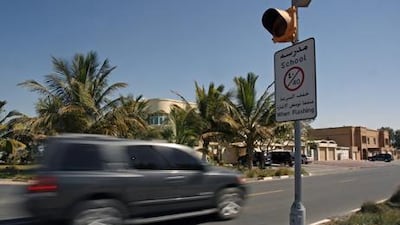ABU DHABI // Drivers caught speeding at 200kph in Dubai face two years in prison.
Traffic police aim to curb reckless driving by using laws already in the federal penal code.
Offenders will be charged with endangering their lives and the lives of others, which is punishable by up to two years' imprisonment, a maximum fine of Dh10,000, or both.
The new policy is already in force in Al Warqa, a popular area for young drivers to race on public roads. "We have started with the implementation and we have already referred cases to the public prosecution," said Maj Gen Mohammed Saif Al Zafeen, the head of Dubai traffic department.
"Each case will be studied by the public prosecution and they might decide to close certain cases, but we will continue to charge these people with endangering other road users' lives."
The new policy is being implemented only in Dubai, but nationwide enforcement may be discussed later. "We hope this will be discussed during the regular meetings between the different forces, and adopted by all," said Maj Gen al Zafeen.
Up to 15 per cent of drivers fined for speeding every day are driving at more than 200kph.
"Driving at such a high speed is a problem on our roads," said Maj Gen al Zafeen. "The aim of this new procedure is to find an efficient measure to deter them. A fine is not enough."
At the moment, drivers caught speeding can be fined from Dh600 to Dh1,000, and may have their car impounded for up to three months.
Although drivers speeding at less than 200kph will not face criminal prosecution, they will still be stopped by traffic patrols, The National's Arabic-language sister paper Al Ittihad reported today.
The new enforcement policy was welcomed yesterday by lawyers, residents and some drivers, although by no means all.
Emirati lawyer Yousif Al Bahar said the possibility of imprisonment may be the only way to slow people down.
He said the move was courageous and much needed as people's lives were at stake.
Eman Al Rifaee, also a lawyer, questioned how Dubai police would be able to cover the whole Emirate.
"Dubai is a big city, so are the police capable of covering all areas, or otherwise what are the mechanisms of implementing this move?" she said.
"It's very important and it's a great move. I once was the victim of a speedy driver and it nearly cost me my life."
The lawyer said the move would reassure pedestrians.
Some residents reacted differently. "One-sixty is not fast in some places," said Ali Izzat, from Dubai. "If the roads are all clear, and it's late and dark, why do I need to drive slow and risk even falling asleep when I can drive quicker to get home?"
Jasim Ismail Al Hosani, an Emirati mechanical engineer at the Emirates Nuclear Energy Cooperation, said he did not find the new decision fair.
"I don't think it is fair that they risk losing their jobs for driving above 200kph," he said. "Every car can easily go above 200 kph. It is better to raise awareness in this regard instead of imposing such a harsh rule."
Nada Hossam, 24, from Dubai, said the criminalisation would help put an end to speeders.
"This will mean a criminal file, facing a prison sentence, a fine, losing your car, and possibly losing your job in the process," she said. "It's just not worth it. I hope that's what they will all think."
Nermeen K said speeding was a problem, particularly among young people, but a prison sentence was too harsh.
"I don't agree with this new decision," she said. "A harsh fine I understand, but a crime, that's too far."
wissa@thenational.ae
salamir@thenational.ae
* Additional reporting by Ola Salem and Asmaa Al Hameli

200kph speeders face two years in UAE prison for danger driving
Also traffic patrols will stop any driver travelling at, and above, 160kph, or who is exceeding the authorised speed limit by more than 60kph, and seize their vehicles.
Most popular today
